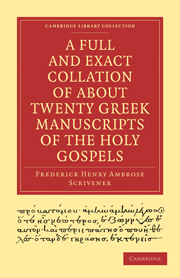 A Full and Exact Collation of About Twenty Greek Manuscripts of the Holy Gospels
A Full and Exact Collation of About Twenty Greek Manuscripts of the Holy Gospels Book contents
- Frontmatter
- ADVERTISEMENT
- Contents
- CHAPTER I On the existing state of the Greek Text of the New Testament
- CHAPTER II On the materials employed in the present volume
- CHAPTER III General observations upon the results of this collation
- Catalogus Librorum Manuscriptorum, Sancta Evangelia complectentium, cum editione Elzevir. 1624 a me collatorum
CHAPTER I - On the existing state of the Greek Text of the New Testament
Published online by Cambridge University Press: 10 November 2010
- Frontmatter
- ADVERTISEMENT
- Contents
- CHAPTER I On the existing state of the Greek Text of the New Testament
- CHAPTER II On the materials employed in the present volume
- CHAPTER III General observations upon the results of this collation
- Catalogus Librorum Manuscriptorum, Sancta Evangelia complectentium, cum editione Elzevir. 1624 a me collatorum
Summary
The following pages comprise an humble yet earnest attempt to revive among the countrymen of Bentley and Mill some interest in a branch of Biblical learning which, for upwards of a century, we have tacitly abandoned to continental scholars. The criticism of the text of Holy Scripture, though confessedly inferior in point of dignity and importance to its right interpretation, yet takes precedence of it in order of time: for how can we consistently proceed to investigate the sense of the Sacred Volume, till we have done our utmost to ascertain its precise words?
Now to whatever cause we may attribute this strange and scarcely creditable neglect on the part of English Divines, it certainly cannot arise from a paucity of unwrought materials, or exhaustion of the subject. On this point, however, in the room of any statement of my own, I will lay before the reader the ingenuous confession of one of the highest living authorities on Biblical Criticism, in one of the most recent of his publications. “Ut enim dicam quod res est, ex omnibus qui collati sunt codices, soli illi Alexandrinus [A], Ephraem. Syri [C], Cantabrigiensis [D], Dublinensis [Z], Sangallensis [Δ] et Dresdensis [G. Paul.] ita sunt excussi, ut quid scriptum singulis locis teneant quid non, scias” (Scholz, Commemoration Address at Bonn, 1845, p. 2).
- Type
- Chapter
- Information
- A Full and Exact Collation of About Twenty Greek Manuscripts of the Holy GospelsDeposited in the British Museum, the Archiepiscopal Library at Lambeth, pp. ix - xxiiiPublisher: Cambridge University PressPrint publication year: 2009First published in: 1853


